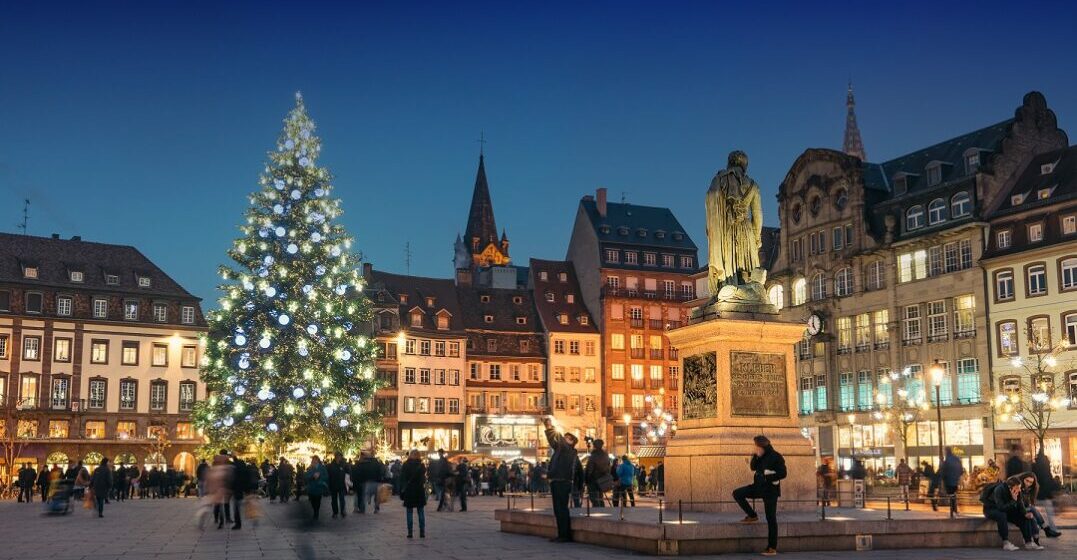Updated on January 5, 2024

Everything you need to know about Christmas in France

Christmas really is the most wonderful time of the year! Many people around the world celebrate this joyful holiday and one of the best things about Christmas is that it comes with an array of traditions, which can vary depending on which country you’re in. France is no exception to this rule and has many interesting Christmas traditions. Let’s discuss some of the most important ones to help you understand how Christmas is celebrated in France. Next time you spend this holiday in the country, you will know exactly what to expect.
France is a secular country, so while Christmas is celebrated, it’s not quite as big a holiday as in the United States, for example. If you walk down a street in a French city in December, you’ll be able to see beautiful, twinkling lights, a Christmas tree in the main square and Christmas decorations in shops. Of course, if you go to the big cities like Paris, there are a lot more Christmas decorations and lights all around (Paris is the City of Light after all!).
One important French Christmas event is the Christmas markets. Most cities and towns will hold some form of market that offers local, artisanal products. Eastern France is renowned for its markets. Christkindelsmärik in Strasbourg is the most famous.
In terms of at home, most people also buy and decorate their Christmas tree at the beginning of Advent, marking four weeks before the big day.
Christmas in France is very much a family affair and Christmas Eve is traditionally the most important date. This is because Le Réveillon de Noël (Christmas Eve), a celebratory dinner, is held on this day with family. If you love French food, this is the event for you! There are no limits when it comes to the French Christmas Eve dinner.
What the French do on Christmas Eve varies between regions and families, but there are certain traditions that are present in most French families. For example, the following products are often part of the French Christmas Eve dinner:
Some regional variations include the famous 13 desserts in Provence.
This dinner often lasts for hours and is a wonderful opportunity to celebrate together as a family. Presents are usually exchanged at this dinner, although families with young children may leave that for Christmas morning. Some families may attend mass before dinner.
For families who celebrated with a Christmas Eve dinner, Christmas Day is a great opportunity to relax at home and recover from the meal the night before. Some families may also be lucky enough to have another Christmas dinner, perhaps with the other side of the family. The Christmas Day dinner tends to be more traditional, for example, a stuffed turkey or capon.
La crèche de Noël is the nativity scene and is a vital French Christmas tradition. Most cities, towns and villages will have a public crèche for everyone to see, and the majority of French families will have their own crèche at home. In Provence, there is a wonderful tradition of using santons for the nativity scene. These are small terracotta figurines that are hand-painted and represent various Provencal village characters. If you go to the south of France at Christmas, you will see the santons on almost every Christmas market. There are also Christmas events in France for the santons, such as fairs.
The final French Christmas tradition worth mentioning is the galette des rois (king’s cake). January 6 is the Epiphany to celebrate when the Three Kings visited Jesus. In France, this is marked with a cake – it’s generally a frangipane cake made of puff pastry. But that’s not all – the galette des rois is also a game! Traditionally, a fève (bean) was hidden in it but nowadays, most bakers hide a figurine in the cake. Whoever has the piece of cake with the figurine in it gets the crown and has to pick his or her queen or king. Furthermore, the winner also has to pay for the next galette, so the fun continues the whole month of January.
Like many countries, Christmas is one of the most important holidays of the year and it’s no different in France. Its many traditions make this event a joyful and exciting time of the year, for children and adults alike. Get the champagne on ice and start learning some French Christmas vocabulary, so you’re well-prepared for this year.